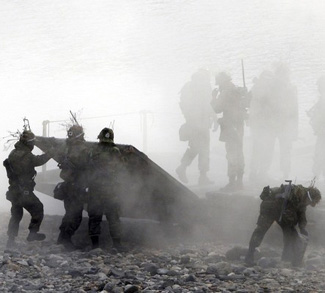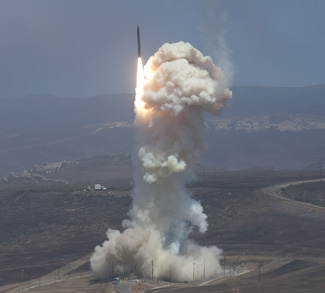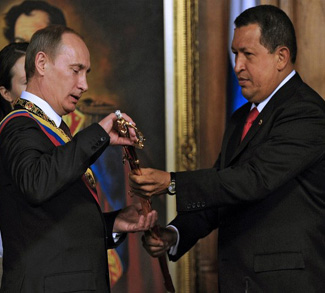FORECAST
In a move aimed at spiting Washington for its planned missile defense system in Central Europe, Russia has announced it will boost bilateral cooperation with Cuba. Such cooperation would entail Russian participation in the development of Cuba’s recently discovered oil fields and a potential military presence off the US coast, signaling a deepening of Russian-US tensions evocative of the Cold War.
The announcement followed a July 30-31st visit to Cuba by a Russian delegation headed by Deputy Prime Minister Igor Sechin. The visit involved discussions with Cuban President Raul Castro to revive economic ties between the former Cold War allies in all areas, including oil production.
Russian stakes in Cuba’s lucrative oil sector will no doubt rub salt in the wounds of US companies shut out by a four decade-long embargo, and also mirrors Russia’s strategic partnership with Venezuela on energy projects. These energy projects would enable the Kremlin to establish an OPEC-like natural gas cartel, gain control over an increasing share of global oil production, and squeeze a US market that gets 10 to 15 per cent of its oil from Venezuela.
However, most provocative of the Russian-Cuban alliance is Russia’s potential to establish a military presence in Cuba, the US’ backyard. This military presence could take the form of an orbital ballistic missile system or a refueling base for nuclear bombers, and is a direct response to US plans to establish a missile defense system on Russia’s doorstep in Central Europe, in addition to extending NATO membership to former Soviet states Georgia and the Ukraine.
Although there is no confirmation regarding Russia’s military plans in Cuba, it does signal what could happen if the US does not heed Russia’s demands for Washington to nix its encroachment into Russia’s backyard.
Russia had already responded to US encroachment by cutting energy supplies to Europe and sending more military into pro-Western Georgia’s secessionist regions, however Russia’s Cuban move will no doubt gain Washington’s attention for it shifts hostilities from Russia’s periphery to the US’ and is evocative of the 1962 Cuban missile crisis. Combined with Russia’s ongoing multi-billion dollar arms deal with Venezuela aimed at countering US aggression in Latin American, the US would be hard pressed to ignore Russia’s response to perceived threats and violation of the Monroe Doctrine.
With the upcoming US presidential race, an economic crisis, and its hands full in the Middle East, it remains to be seen whether the US will back down or escalate the situation with Russia and Cuba. If the latter does occur, it would herald a Cold War redux.
In October 1962, the Cuban Missile Crisis brought the US and the USSR to the brink of war when Soviet missiles were stationed in Cuba.
The crisis was resolved after 12 days when the Soviet leader, Nikita Khrushchev, backed down and ordered the missiles removed.
SUMMARY OF EVENTS: July 28 – August 4, 2008
WORLD
Marathon talks on a new global trade pact collapsed on Tuesday as the United States and India refused to compromise over a proposal to help poor farmers deal with floods of imports.
The European Union’s trade chief Peter Mandelson said on Wednesday the United States helped to bring down global trade talks this week when its negotiators shunned a compromise proposal at a key juncture in the talks.
More than 100 nonaligned nations backed Iran’s right to peaceful uses of nuclear power on Wednesday, an endorsement sought by Tehran in its standoff with the U.N. Security Council over its refusal to freeze uranium enrichment.
NORTH AMERICA
United States
The downward spiral of U.S. housing prices still has a way to go and homes were overvalued by between 8 percent to 20 percent in the first quarter of this year, according to research by an International Monetary Fund economist published on Friday.
President Bush has issued an executive order that revises the rules for intelligence agencies and strengthens the authority of the national intelligence director, the White House said Thursday.
Banks borrowed a record amount of funds from the Federal Reserve in the latest week as the year old credit crisis took a persistent toll, while the commercial paper market continued to contract, signaling tough conditions for short term borrowers.
SOUTH AMERICA
Venezuela
Leftist President Hugo Chavez said he will nationalize the Bank of Venezuela, one of the country’s largest, and has asked the bank’s Spanish owners, Grupo Santander, for a meeting to set a price for the deal.
Venezuelan President Hugo Chavez failed to show up for a narcotics summit of Latin American leaders on Friday and his government said he did not attend because of security concerns.
WESTERN EUROPE
Italy
The Italian government launched on Tuesday a scheme that will deploy 3,000 troops in major Italian cities to help patrol the streets, local media reported.
EASTERN EUROPE
Chechen Republic
Chechen President Ramzan Kadyrov has denied rumors about an assassination attempt on him, calling them “provocations” aimed at destabilizing the situation in the Russian North Caucasus republic.
Serbia
Stone-throwing hooligans clashed in Belgrade Tuesday with Serbian riot police who replied with rubber bullets and tear gas after a rally against Radovan Karadzic’s looming war crimes transfer.
Former Bosnian Serb leader Radovan Karadzic claimed Friday the United States wanted him dead after reneging on a deal to shield him from trial by the UN war crimes court.
MIDDLE EAST
Iran
Iran’s plans to join the Shanghai Cooperation Organization (SCO) remain unchanged, the country’s ambassador to Moscow said on Monday.
Tension in the Mideast region requires active cooperation between Iran and Syria, the Iranian parliament speaker said Tuesday.
Iran will press ahead with its nuclear path, the country’s highest authority, Supreme Leader Ayatollah Ali Khamenei, said on Wednesday, speaking just before a deadline set by Western officials in a nuclear dispute.
Iran’s president said on Friday the Islamic Republic would “stand against” its enemies with its “power”, speaking just before a deadline set by Western officials in a dispute over Tehran’s nuclear ambitions.
Iraq
The U.S. military has admitted that a platoon of soldiers raked a car of innocent Iraqi civilians with hundreds of rounds of gunfire and that the military then issued a news release larded with misstatements, asserting that the victims were criminals who had fired on the troops.
Israel
Israel was bracing on Thursday for weeks of political turmoil after Prime Minister Ehud Olmert’s shock announcement that he would step down in September, casting a shadow over Middle East peacemaking.
Palestine
Palestinian Prime Minister Salam Fayyad has appealed to the World Bank to help him secure emergency financing to bridge a shortfall in donor funds and pay public workers, Palestinian and European sources said on Tuesday.
Turkey
Turkey’s military said on Sunday its fighter jets hit 12 Kurdish separatist targets in northern Iraq’s Qandil region in an operation that started at midnight.
EAST ASIA
China
Foreign-owned hotels in China face the prospect of “severe retaliation” if they refuse to install government software that can spy on Internet use by hotel guests coming to watch the summer Olympic games, a U.S. lawmaker said Tuesday.
SOUTH ASIA
American intelligence agencies have concluded that members of Pakistan’s powerful spy service helped plan the deadly July 7 bombing of India’s embassy in Kabul, Afghanistan, according to United States government officials.
Afghanistan
Afghanistan should not alone be blamed for its large drugs output, with chemicals used to turn opium into heroin coming from other countries including China and Russia, the United Nations said Monday.
Marsha Reid is a contributor to Geopoliticalmonitor.com



